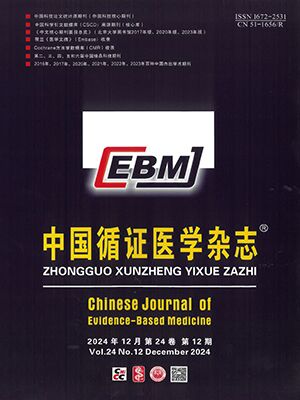| 1. |
张悦, 张士靖, 周志超, 等. 国际临床指南评价工具的发展与启示. 中华医学图书情报杂志 2015, 24(1): 11-16.
|
| 2. |
王丽颖, 刘孟宇, 王跃溪, 等. 我国临床诊疗指南评价现状述评. 中华中医药杂志, 2016, 31(4): 1316-1319.
|
| 3. |
Kim SY. Recent advance in clinical practice guideline development methodology. Korean J Fam Med, 2022, 43(6): 347-352.
|
| 4. |
Qumseya B, Goddard A, Qumseya A, et al. Barriers to clinical practice guideline implementation among physicians: a physician survey. Int J Gen Med, 2021, 14: 7591-7598.
|
| 5. |
Lima JP, Mirza RD, Guyatt GH. How to recognize a trustworthy clinical practice guideline. J Anesth Analg Crit Care, 2023, 3(1): 9.
|
| 6. |
Vlayen J, Aertgeerts B, Hannes K, et al. A systematic review of appraisal tools for clinical practice guidelines: multiple similarities and one common deficit. Int J Qual Health Care, 2005, 17(3): 235-242.
|
| 7. |
Graham ID, Calder LA, Hébert PC, et al. A comparison of clinical practice guideline appraisal instruments. Int J Technol Assess Health Care, 2000, 16(4): 1024-1038.
|
| 8. |
孙雅佳, 史乾灵, 杨楠, 等. 临床实践指南综合评价的思考与探索. 协和医学杂志, 2023, 14(1): 22-30.
|
| 9. |
AGREE Collaboration. Development and validation of an international appraisal instrument for assessing the quality of clinical practice guidelines: the agree project. Qual Saf Health Care, 2003, 12(1): 18-23.
|
| 10. |
Brouwers MC, Kerkvliet K, Spithoff K, et al. The AGREE reporting checklist: a tool to improve reporting of clinical practice guidelines. BMJ, 2016, 352: i1152.
|
| 11. |
倪明, 王琳辉, 李广涛, 等. 基于AGREE-China对中文乳腺癌诊治相关指南/共识的质量评估. 中国肿瘤, 2022, 31(10): 828-838.
|
| 12. |
Chen YL, Yang KH, Marušić A, et al. A reporting tool for practice guidelines in healthcare: the right statement. Ann Intern Med, 2017, 166: 128-132.
|
| 13. |
刁莎, 李思雨, 石雨晴, 等. 指南临床适用性评价工具(2. 0版)解读. 中国循证医学杂志, 2023, 23(11): 1318-1322.
|
| 14. |
靳英辉, 赵志慧, 黄粲然, 等. 临床实践指南实施性评价工具的研制和验证评价. 中国循证医学杂志, 2022, 22(1): 111-119.
|
| 15. |
Yang N, Liu H, Zhao W, et al. Development of the scientific, transparent and applicable rankings (star) tool for clinical practice guidelines. Chin Med J, 2023, 136(12): 1430-1438.
|
| 16. |
Siering U, Eikermann M, Hausner E, et al. Appraisal tools for clinical practice guidelines: a systematic review. PLoS One, 2013, 8(12): e82915.
|
| 17. |
Brouwers MC, Kho ME, Browman GP, et al. Development of the AGREE II, part 1: performance, usefulness and areas for improvement. CMAJ, 2010, 182(10): 1045-52.
|
| 18. |
Brouwers MC, Spithoff K, Kerkvliet K, et al. Development and validation of a tool to assess the quality of clinical practice guideline recommendations. JAMA Netw Open, 2020, 3(5): e205535.
|
| 19. |
Brouwers MC, Lavis JN, Spithoff K, et al. Assessment of health systems guidance using the appraisal of guidelines for research and evaluation - health systems (agree-hs) instrument. Health Policy, 2019, 123(7): 646-651.
|
| 20. |
Antoniou SA, Florez ID, Markar S, et al. AGREE-S: AGREE II extension for surgical interventions: appraisal instrument. Surg Endosc, 2022, 36(8): 5547-5558.
|
| 21. |
Brouwers MC, Kho ME, Browman GP, et al. The global rating scale complements the AGREE II in advancing the quality of practice guidelines. J Clin Epidemiol, 2012, 65(5): 526-534.
|
| 22. |
王吉耀, 王强, 王小钦, 等. 中国临床实践指南评价体系的制定与初步验证. 上海医学, 2018, 41(6): 321-326.
|
| 23. |
Zhou Q, Xing D, Li Q, et al. An extension of the RIGHT statement for introductions and interpretations of clinical practice guidelines: right for int. J Evid Based Med, 2022, 15(1): 55-63.
|
| 24. |
Tang C, Duan Y, Zhang Y, et al. RIGHT for acupuncture: an extension of the right statement for clinical practice guidelines on acupuncture. J Clin Epidemiol, 2021, 139: 330-339.
|
| 25. |
Xie R, Xia Y, Chen Y, et al. The RIGHT extension statement for traditional Chinese medicine: development, recommendations, and explanation. Pharmacol Res, 2020, 160: 105178.
|
| 26. |
Wang X, Chen Y, Akl EA, et al. The reporting checklist for public versions of guidelines: RIGHT-PVG. Implement Sci, 2021, 16: 10.
|
| 27. |
Song Y, Alonso-Coello P, Ballesteros M, et al. A reporting tool for adapted guidelines in health care: the RIGHT-Ad@pt checklist. Ann Intern Med, 2022, 175(5): 710-719.
|
| 28. |
Li X, Huang L, Wang L, et al. the reporting checklist for Chinese patent medicine guidelines: RIGHT FOR CPM. Pharmacol Res, 2024, 199: 107015.
|
| 29. |
Vernooij RWM, Alonso-Coello P, Brouwers M, et al. Reporting items for updated clinical guidelines: checklist for the reporting of updated guidelines (CheckUp). PLoS Med, 2017, 14(1): e1002207.
|
| 30. |
Shiffman RN, Shekelle P, Overhage JM, et al. Standardized reporting of clinical practice guidelines: a proposal from the conference on guideline standardization. Ann Intern Med, 2003, 139: 493-498.
|
| 31. |
靳英辉, 赵志慧, 黄粲然, 等. 临床实践指南实施性评价工具的研制和验证评价. 中国循证医学杂志, 2022, 22(1): 111-119.
|




